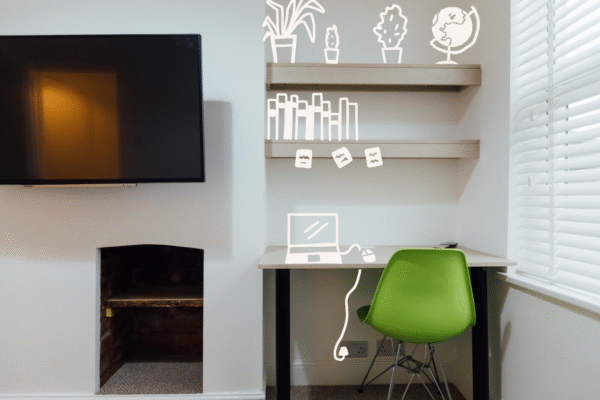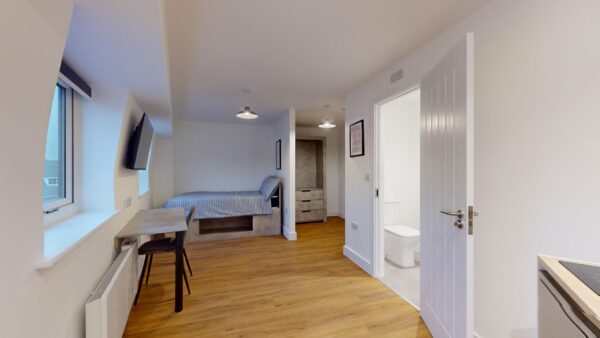Latest Posts

Breast Cancer Awareness Month – Everything You Need to Know
Every October, you’ll notice a wave of pink ribbons appearing on social media, shopfronts, and even on sports kits.
That’s because October marks Breast Cancer Awareness Month – a global campaign dedicated to raising awareness about one of the most common cancers worldwide. But what’s it all about, why is it important, and how can you get involved?
Let’s break it down.
What is Breast Cancer Awareness Month?
Breast Cancer Awareness Month was first established in the 1980s and has since become one of the most recognised health campaigns in the world. The aim is simple: to raise awareness of breast cancer, promote the importance of early detection, and support ongoing research and treatment efforts.
The pink ribbon is the universal symbol of the movement. You’ll see it pinned on coats, lighting up landmarks, and woven into fundraisers. It’s more than just a colour choice – it’s a sign of solidarity with those affected and a reminder to keep the conversation going.
Why it Matters
Breast cancer is the most common cancer among women globally, and men can be affected too, though at much lower rates. In the United Kingdom alone, around 1 in 7 women will be diagnosed with breast cancer during their lifetime.
That might sound daunting, but the good news is that survival rates are improving, largely thanks to awareness campaigns and advances in research.
The key is early detection. Spotting symptoms early, such as changes in breast shape, lumps, or unusual discharge, can make treatment far more effective. Awareness month reminds everyone to check themselves regularly, get screenings where appropriate, and talk openly about symptoms that might otherwise go unnoticed.
What Students Should Know
If you’re a student, you might think breast cancer awareness doesn’t really apply to you – but it does. While breast cancer is more common in older women, younger people can still be affected.
Knowing the signs early and building the habit of regular self-checks is invaluable. On top of that, universities and student groups often use October as a chance to fundraise and spread awareness.
From charity runs to pink-themed socials, there are plenty of ways students can get involved, contribute, and make a difference. Plus, it’s a great way to build community spirit while supporting a cause that touches so many lives.
How to Get Involved
Raising awareness doesn’t have to mean climbing a mountain or running a marathon – though you certainly can if that’s your thing. Here are some simple but effective ways to play your part:
- Wear Pink with Purpose: Whether it’s a ribbon on your jacket, a pink hoodie, or a themed sports kit, wearing pink is an easy way to show support and spark conversations.
- Fundraising Events: Bake sales, sponsored walks, quiz nights, or even dyeing your hair pink – creativity is key. Every penny raised supports research, patient care, and educational campaigns.
- Social Media Power: Share posts, stories, or even personal messages about the importance of awareness. Platforms like Instagram and TikTok are powerful spaces for spreading health messages among younger audiences.
- Get Educated: Take a few minutes to read up on symptoms, screening, and support services. Knowing what to look out for means you’re better equipped to help yourself and others.
- Volunteer or Donate: Charities such as Breast Cancer Now, Coppafeel! and Cancer Research UK always welcome donations or volunteer support, whether that’s shaking buckets at events or helping with local campaigns.
Breaking the Stigma
One of the biggest impacts of Breast Cancer Awareness Month has been breaking down the stigma around talking about breast health.
In the past, conversations about cancer often felt taboo or uncomfortable. Today, the pink ribbon has helped make it easier to discuss symptoms, treatment, and emotional support.
This openness is especially vital for students and younger generations, where embarrassment or lack of knowledge might prevent someone from speaking up. Awareness campaigns encourage honest conversations and normalise the idea that it’s okay to ask questions or seek help.
A Global Effort with Local Impact
While Breast Cancer Awareness Month is international, the impact is very much felt locally. Universities, workplaces, and community groups run their own events, each adding to the bigger picture.
For example, a small bake sale on campus might raise £200, which could help fund counselling sessions for patients or contribute to research grants. The beauty of the campaign is that no effort is too small – everything counts.
Final Thoughts
Breast Cancer Awareness Month isn’t just about pink ribbons and fundraising (though those are important). It’s about saving lives through education, encouraging people to take their health seriously, and standing shoulder to shoulder with those affected by breast cancer.
For students and young people, it’s a chance to learn habits that could one day save lives – yours or someone else’s. It’s also a chance to rally together, make a positive impact, and prove that awareness really does make a difference.
So this October, don’t just notice the pink ribbons – join in. Whether you’re baking cupcakes, sharing a post, or checking yourself for the first time, you’re part of a movement that matters.
Read More
Getting Around Lincoln: Transport Tips for Students
Moving to Lincoln for your studies is exciting – the city’s mix of history, student life, and charm make it a brilliant place to live. But once you’ve settled into your new home, one of the first things you’ll need to figure out is how to get around.
Luckily, Lincoln isn’t huge, but having a few transport tips up your sleeve can save you time, money, and a fair bit of hassle. Here’s a guide to navigating the city like a local.
Walking: The Simplest Way Around
Lincoln is a very walkable city, and for students, walking is often the easiest way to get from A to B. The city centre is compact, with the University of Lincoln campus sitting right by the Brayford Pool. Shops, restaurants, and nightlife are just a short stroll away.
That said, Lincoln does have its challenges – mainly the infamous Steep Hill. It connects the lower town with the Cathedral Quarter, and it’s exactly what the name suggests.
Walking up it is basically a workout, but the views at the top and the quirky shops along the way make it worthwhile. If you’re heading to lectures or student events in that area, be prepared to factor in a bit more time (and maybe wear comfy shoes).
Buses: Your Student-Friendly Option
If walking isn’t always practical, Lincoln’s bus network is the next best option. Stagecoach East Midlands runs most of the routes across the city and beyond, and as a student, you can save money with their discounted tickets.
The main bus station is right in the city centre, next to the train station, making it easy to connect to other parts of Lincolnshire or even Nottingham and Sheffield. For everyday travel, though, buses can get you to retail parks, supermarkets, and student accommodation areas further out of the centre.
Stagecoach offers unlimited travel passes which are brilliant if you’re hopping on and off regularly. There’s also the app that lets you buy tickets, plan routes, and even track your bus in real time – ideal for those early morning lectures when you don’t want to be waiting around in the cold.
Cycling: A Popular Choice
Lincoln is pretty cycle-friendly, and many students choose bikes as their main way of getting around. It’s cheap, eco-friendly, and often quicker than driving or catching a bus in peak traffic.
There are cycle lanes in and around the city centre, and the Water Rail Way is a traffic-free path running from Lincoln to Boston – great for leisure rides if you want a scenic break from studying.
Around campus, you’ll also find plenty of cycle racks, so you can lock up securely while you’re in lectures.
If you don’t have a bike, Lincoln has second-hand shops and student groups where you can pick one up cheaply. Don’t forget a good lock, helmet, and lights – the city can be dark in winter months, and Lincolnshire police run safety campaigns reminding cyclists to stay visible.
Trains: For Trips Beyond Lincoln
While you won’t use trains much for day-to-day uni life, Lincoln’s train station is handy for weekends away.
Services connect you to Nottingham, Sheffield, Doncaster, and even direct to London King’s Cross. Advance tickets can be surprisingly affordable if you plan ahead, especially with a 16–25 Railcard (which saves you a third on fares).
It’s worth noting that trains can be pricey if you buy at the last minute, so keep them for planned trips rather than local errands.
Taxis and Ride-Sharing: Handy for Nights Out
For late nights or situations where buses and walking aren’t ideal, taxis can be a lifesaver. Lincoln has several local taxi firms, and you’ll find plenty of them around the train station and city centre hotspots. Prices are reasonable for short trips, especially if you split the fare with friends.
Uber isn’t widely available in Lincoln yet, but some smaller ride-hailing apps do operate. Still, most students rely on local taxi numbers saved in their phones for convenience.
Budgeting Tips for Student Transport
Transport costs can add up quickly if you’re not careful, but with a bit of planning, you can keep them under control. Here are some quick student hacks:
- Get a student bus pass: Stagecoach’s passes are cheaper in the long run if you’re using buses regularly.
- Walk where you can: Lincoln’s compact size means many journeys don’t need paid transport.
- Invest in a railcard: If you’re travelling home often, the savings stack up fast.
- Share rides: Whether it’s a taxi after a night out or a lift with a friend, splitting costs makes transport more affordable.
Final Thoughts: Finding Your Rhythm
Every student finds their own transport routine in Lincoln. Some rely almost entirely on walking and biking, while others mix buses with the occasional train or taxi.
The good news is you won’t need to spend a fortune – Lincoln’s size means most of your essentials are close by, and when you do need to go further, student discounts are there to help.
So whether you’re pedalling along the Brayford, waiting for a Stagecoach bus, or braving Steep Hill on foot, getting around Lincoln quickly becomes second nature. Once you find the rhythm that works for you, you’ll be free to enjoy everything this historic city has to offer.
Read More
September at loc8me: New city, new systems, and bold steps forward 🍊
Hey everyone 👋 welcome back to the loc8me newsletter.
This month we’ve got plenty to shout about: a brand-new city joining the map, big moves for landlords, a growing contractor list, and some bold steps in marketing!
HubSpot has landed 🚀
Big shoutout to our team for getting us rolling with HubSpot. It’s not just another system, it’s about keeping things smooth, simple, and making sure no one’s left chasing endless email threads. Efficiency = more time to focus on people, not paperwork.

Turning the UK orange with another city added to our list 🏙️
September marked a huge milestone: we’ve expanded into our 16th city → Exeter! We are super excited to learn a new market and bring the loc8me energy to another city. If you’re a landlord (or know one) looking for a fresh approach to student housing in Exeter, we’d love to chat.

Investing more into landlords 🧡
On 14th October we’ll be at the National Landlord Investment Show in Manchester with our friends at YieldMe . A chance to connect, share ideas, and strengthen relationships. If you’re there, come say hi 👋
We’re expanding our contractor list 🛠️
From roofers and electricians to plumbers, carpet fitters, and handymen, we’re always building our trusted network.
We pride ourselves on resolving maintenance issues quickly, and we want the best people on board. Know someone? Tag them below.
📣 We’re upping our marketing game
- The Microlino – Our tiny car is getting a Halloween makeover. Keep an eye on our Instagram and TikTok for the reveal 👻
- Merch incoming – We’re working on new uniform that our teams and students will actually want to wear and use.
- Reaching the billboards – We do marketing different at loc8me! If you’re around Leeds, see if you can find us (Clue: look up)👀
That’s September wrapped. One more city on the map, new faces in our network, and plenty more still to come. Thanks for being part of the journey, see you next month.
Thanks for reading, – Ollie Coe Apprentice at loc8me Apprenticeship Academy
Read More
Student Myths vs Reality: What Living in Student Housing is Really Like
Moving into student housing is one of those milestones that feels both exciting and slightly terrifying.
For many, it’s the first time living away from family, and with that comes a whole lot of expectations – some fuelled by TV shows, others by older siblings or friends who’ve gone before you. But how much of what you’ve heard is actually true?
Let’s bust some of the biggest myths about student housing and reveal the reality of what it’s really like to live in private accommodation or halls.
Myth 1: Student Housing is Always a Messy Chaos
Expectation: You picture mouldy dishes stacked to the ceiling, bins overflowing, and corridors that smell faintly of pizza and regret.
Reality: Okay, let’s be honest – there will be messy moments. Not everyone is a neat freak, and when you put six people together who are all adjusting to independence, things can get a little wild. But it’s not all chaos. In fact, most students quickly figure out some kind of routine to make communal living work.
You’ll likely find that one housemate becomes the “cleaning captain,” another is strict about washing up after themselves, and a third might be a bit more relaxed about things. Over time, most student houses settle into a balance.
Top tip? Have an honest chat early on and maybe set up a simple cleaning rota. It makes life much easier, and it prevents those passive-aggressive notes from being stuck to the fridge.
Myth 2: You’ll Instantly Be Best Friends with Your Housemates
Expectation: You imagine your student house turning into an episode of Friends – late-night chats, pizza parties, and everyone getting along like one big family.
Reality: Sometimes, this does happen! But in most cases, it’s more of a mixed bag. You’ll meet people from all kinds of backgrounds, with different interests, personalities, and routines. Some might become your lifelong friends, while others you’ll get along with politely without ever hanging out outside the kitchen. And that’s okay.
The real trick is to keep an open mind and not put too much pressure on the idea of being “besties.” You’ll have plenty of opportunities to make friends through your course, societies, and nights out.
Your housemates don’t have to be your closest circle – they just need to be respectful and easy enough to live with.
Myth 3: Student Housing is Always Falling Apart
Expectation: You imagine damp walls, squeaky beds, dodgy boilers, and landlords who never pick up the phone.
Reality: While there are definitely some horror stories, most private student housing and managed accommodation is decent and safe. In fact, many landlords and letting agencies now specialise in student properties and keep them well maintained because it’s in their interest to do so.
That being said, don’t expect luxury. Your house won’t be a boutique hotel – it’s more likely to be “functional and comfortable” than “Pinterest-worthy.” You might need to get used to squeaky doors or dated furniture, but that’s part of the charm. And if something really isn’t up to standard, you’re entitled to ask your landlord to fix it.
Myth 4: Cooking for Yourself is a Nightmare
Expectation: You’ll starve, live on takeaway, or survive solely on beans on toast and instant noodles.
Reality: While beans on toast will probably make an appearance, most students surprise themselves when it comes to cooking. It’s often the first time you’re in charge of your own meals, and it can actually be fun experimenting with recipes (especially when you’re cooking with flatmates).
The reality is somewhere in between: you’ll have weeks where you meal-prep like a pro and weeks where you can’t be bothered and live off frozen pizza. That’s normal. The key is balance – learn a few simple, cheap meals you can rely on, and keep some basics in the cupboard for emergencies.
You don’t need to be a gourmet chef to survive, but knowing how to make a decent pasta dish will take you a long way.
Myth 5: It’s Going to Feel Lonely Living Away from Home
Expectation: You imagine homesickness hitting hard, missing your family dinners, and feeling cut off.
Reality: At first, it can feel a little strange, especially if it’s your first time living independently. But loneliness isn’t the reality for most students long-term. Between classes, housemates, and social events, your calendar will fill up faster than you expect.
What really happens is that you start building a new kind of “home” – whether that’s sharing dinner with housemates, joining a society, or just hanging out in someone’s room watching films. And thanks to video calls, you’re never too far from family and friends back home.
Myth 6: You’ll Have Total Freedom and Do Whatever You Want
Expectation: No parents, no rules. You can stay up until 4am, eat crisps for dinner, and have people over whenever you like.
Reality: Technically, yes, you have freedom. But with that comes responsibility. Bills need to be paid on time, food doesn’t magically appear in the fridge, and laundry doesn’t do itself. You’ll also realise pretty quickly that staying up until 4am on a weeknight is less fun when you’ve got a 9am lecture the next day.
The reality of freedom is that it’s all about balance – you learn when to have fun and when to be sensible. And while it can feel overwhelming at first, these are the skills that will stick with you well beyond uni life.
Myth 7: Student Housing is Too Expensive for What You Get
Expectation: You think you’ll be paying sky-high rent for a tiny box room and wondering where your money goes.
Reality: Rent can be a big chunk of your student budget, but most student housing is priced fairly for what’s included. In private accommodation, you often get bills, WiFi, and maintenance included in the cost, which takes a lot of stress out of budgeting.
The trick is to weigh up what’s important to you. Do you want to be right next to campus, or are you happy to walk a little further to save money? Would you rather share a bathroom to keep costs down, or does having your own ensuite feel worth the extra?
Understanding your priorities makes finding the right balance much easier.
Myth 8: It’ll Be Just Like Halls Every Year
Expectation: You think every year will feel like first-year halls – big groups, constant socialising, and noisy corridors.
Reality: First-year halls are usually the most social experience because everyone’s new and looking to meet people. Private housing in later years tends to be quieter, with smaller groups and more independence. That doesn’t mean it’s boring – it just means the vibe shifts.
By the time you’re in second or third year, you’ll probably enjoy the calmer pace. You’ll have your established group of friends, and your house will feel more like a proper home. It’s less about “hall parties” and more about cosy film nights or cooking together.
Myth 9: Student Housing is Unsafe
Expectation: You hear stories about dodgy locks or break-ins and imagine the worst.
Reality: Like any accommodation, safety depends on where you live and how you look after the property. Most student houses are fitted with secure locks and alarms, and if you use common sense – like locking doors and not leaving valuables out in the open – you’ll be fine.
Many landlords and letting agencies also take safety seriously because it’s part of their duty of care. If you ever feel your house isn’t secure, it’s something you can and should raise straight away.
Myth 10: You’ll Never Want to Leave Once Uni is Over
Expectation: You imagine student housing will be so fun you’ll want to live with your mates forever.
Reality: Living with friends is great, but by the end of your degree, most people are ready to move on. Student houses are a unique phase of life – you’ll make amazing memories, but you’ll also appreciate the idea of having your own space one day. And that’s exactly how it should be.
Final Thoughts: Embracing the Student Housing Experience
Living in student housing is full of ups and downs, but that’s what makes it so memorable. The reality usually sits somewhere between the myths – it’s not all chaos, but it’s not a luxury penthouse either.
You’ll laugh, you’ll learn, and you’ll grow more independent than you ever thought possible.
So don’t worry too much about the horror stories. Go into it with an open mind, be ready to compromise, and remember that everyone’s figuring it out together. Before long, you’ll look back and realise that those student housing years were some of the most formative – and fun – times of your life.
Read More
Wellbeing in Autumn: How to Beat the Post-Summer Blues at University
Autumn is a season of change. The leaves turn golden, the air gets cooler, and university campuses start buzzing with students settling back into lectures, deadlines, and social life.
But for many, the shift from long summer evenings to darker autumn nights can feel like a bit of a downer. It’s not uncommon to experience low mood, fatigue, or a lack of motivation as the seasons change – a phenomenon often called the “post-summer blues.”
If you’re a student juggling assignments, societies, and maybe even part-time work, this dip in mood can feel even more intense. But the good news? With a few practical steps, you can boost your wellbeing and make autumn one of your best seasons yet.
Understanding the Post-Summer Blues
The change in seasons doesn’t just affect the weather – it can also affect your body and mind.
Shorter days mean less sunlight, which can lower your levels of serotonin (a mood-boosting chemical) and disrupt your sleep cycle. That’s why many people feel more sluggish, less motivated, and sometimes even a bit down when autumn arrives.
For students, the combination of academic pressure, a new routine, and fewer daylight hours can easily pile up. Recognising what’s happening is the first step to doing something about it.
Lighten Up with Light Therapy
If you’re finding it harder to wake up in the mornings or feel energised throughout the day, light therapy might be a game-changer. Light therapy lamps mimic natural daylight and can help regulate your body clock, improve your mood, and even boost your concentration for those long study sessions.
You don’t need anything fancy to get started. A basic light therapy box used for 20–30 minutes in the morning can make a noticeable difference.
If that’s not an option, try to spend as much time as you can outdoors during daylight hours – even a 15-minute walk between lectures can do wonders.
Stay Active, Stay Positive
Exercise is one of the most effective ways to lift your mood, and autumn is a great season to keep moving. Whether it’s joining a sports society, hitting the campus gym, or simply going for a run through the crunchy leaves, staying active will help your body release endorphins (your natural feel-good hormones).
The key is to find something you actually enjoy. If you’re not into team sports, try yoga or a dance class. If the gym feels intimidating, download a fitness app and work out in your room. Even short bursts of activity can break up long study sessions and help keep your energy levels up.
Build Social Connections
The darker evenings can make it tempting to curl up in bed with Netflix, but isolation can make low moods worse. University is full of opportunities to connect with others – whether through societies, study groups, or just grabbing coffee with a flatmate.
If you’re feeling the blues, making plans (even small ones) can give you something to look forward to. Think of it as balancing cosy nights in with energising social time. Both are important for your wellbeing.
important for your wellbeing.
Focus on Sleep and Routine
Autumn’s darker mornings can throw your sleep schedule off track, but sticking to a routine makes a huge difference. Aim to wake up and go to bed around the same time each day, and try to get at least 7–8 hours of rest.
If you struggle with winding down, swap your phone scroll for something more calming like reading, journaling, or listening to a podcast. A consistent routine will help your body adapt to the seasonal shift and keep your mind clear for studies.
Nourish Your Body and Mind
What you eat can have a big impact on your mood and energy levels. Comfort food is tempting in autumn, but balance it with nourishing meals that include plenty of fruit, vegetables, and protein.
Omega-3 rich foods (like salmon or walnuts) and vitamin D supplements can also help boost your mood when sunlight is scarce.
Don’t forget your mental nourishment, too. Taking breaks, setting realistic goals, and practicing mindfulness – whether through meditation apps or simply pausing for deep breaths – can all help you feel more balanced.
Know When to Ask for Help
Sometimes the post-summer blues can feel heavier than expected, and that’s okay. If your mood is consistently low or you’re finding it hard to cope, it’s important to reach out for support.
Most universities offer wellbeing services, counselling, or peer support groups. Talking to a trusted friend, tutor, or professional can make a huge difference.
Remember, you’re not alone – many students feel this way, and seeking help is a sign of strength, not weakness.
Embracing Autumn
Instead of seeing autumn as the gloomy end to summer, think of it as a chance to reset. It’s the season of cosy jumpers, hot drinks, and new beginnings on campus. By looking after your wellbeing – from light exposure and exercise to sleep and social connection – you can turn the post-summer blues into an opportunity for growth.
University life can be intense, but autumn is also full of colour, energy, and change. With the right mindset and habits, you can embrace the season and make it one to remember.
Read More
Getting Around Loughborough: Transport Tips for Students
Starting life as a student in a new town is always an adventure, and one of the most important things to figure out early on is how you’ll get around.
In Loughborough, students are lucky to have plenty of transport choices that make navigating both the university campus and the wider town straightforward.
From walking to cycling, buses to trains, each option offers its own advantages, depending on your lifestyle, student budget, and how quickly you need to get somewhere.
Walking Around Town
One of the simplest and most cost-effective ways to travel is on foot. The university campus is large, but once you get familiar with your hall or accommodation area, most of the essential facilities are just a short walk away.
The town centre is around a twenty-minute walk from campus, making it easy to head into Loughborough for shopping, a meal, or a night out.
Walking is not only free but also gives you a chance to take in the atmosphere of the town and enjoy a bit of exercise along the way. For many students, walking becomes the default mode of travel for short distances, especially during the daytime.
Cycling: Quick and Convenient
For those who prefer something faster, cycling is a fantastic option. Loughborough is well-suited for cyclists thanks to its relatively flat terrain and compact layout.
The university has invested in cycling infrastructure, including dedicated cycle routes and plenty of bike racks spread across campus, so finding a safe place to leave your bike is rarely a problem.
If you don’t have a bike when you arrive, there are second-hand options available through student groups and local shops, and the university often organises bike fairs where you can pick one up at a reasonable price. Essential kit includes a sturdy lock, lights for evening rides, and a helmet for safety.
Many students also choose to get their bikes security-marked on campus for peace of mind. For short to medium journeys, cycling strikes the perfect balance between independence, cost-effectiveness, and sustainability.
Buses: The Kinchbus Sprint and More
When it comes to bus travel, Loughborough is particularly student-friendly. The Kinchbus Sprint service is the most popular choice for students, running regularly between the university campus, the town centre, and the railway station.
With buses every ten minutes during the day, it’s a reliable and convenient way to travel if you live off-campus or need to get across town quickly.
Tickets are affordable, and student discounts or term-time passes can help keep costs down further if you use the service regularly. Other bus routes also connect Loughborough with nearby towns and villages, which makes weekend trips beyond campus easy to arrange without needing a car.
For those who prefer public transport to cycling, the bus system provides a dependable alternative.
Train Links for Weekend Trips
For journeys further afield, the train station is your best bet. Situated on the Midland Main Line, Loughborough offers direct services to cities like Leicester, Nottingham, Derby, and Sheffield, with London St Pancras just over an hour away.
This makes it ideal for weekend trips home or day outings with friends.
Students who plan to travel regularly should consider purchasing a 16–25 Railcard, which provides a third off most fares and quickly pays for itself. Booking tickets in advance through apps or train websites can also save a significant amount compared to buying tickets on the day.
With a bit of planning, train travel becomes a very budget-friendly way of connecting with cities beyond Loughborough.
Taxis and Ride-Sharing
Taxis are generally more expensive than other options, but they can be invaluable after a night out or when you need to get somewhere quickly and public transport isn’t running.
Loughborough has several reliable local taxi companies, and although Uber availability can vary, it is worth checking the app if you’re in need of a lift. Sharing a taxi with friends is a simple way to split the cost and make this form of transport more affordable.
Making Transport Budget-Friendly
Students are often conscious of keeping costs under control, and transport can easily eat into your budget if you’re not careful.
One of the best ways to save money is by investing in passes – whether that’s a bus season ticket or a railcard – as the initial cost usually pays off within a few journeys.
It’s also worth asking about student discounts whenever you’re using local services, as many businesses in Loughborough cater directly to the student population. Planning journeys in advance, especially when it comes to trains, can also save a substantial amount.
Many students also find that mixing their transport methods helps to keep spending under control. Walking for short trips, cycling for slightly longer journeys, and using buses or trains when necessary creates a flexible system that doesn’t rely too heavily on one expensive option.
Exploring Beyond Campus
While most journeys revolve around campus and the town centre, there’s much more to discover beyond Loughborough.
The surrounding countryside is filled with beauty spots like Beacon Hill and Bradgate Park, which are perfect for a weekend hike or picnic. Cycling out of town or hopping on a cheap bus service can open up opportunities to explore the wider Leicestershire area.
For students, these trips provide the perfect balance of relaxation and adventure when you need a break from studying.
Final Thoughts
Navigating Loughborough as a student doesn’t need to be complicated. With a combination of walking, cycling, affordable bus services, and excellent train links, the town offers plenty of ways to get around that suit different needs and budgets.
By taking advantage of discounts, planning ahead, and mixing transport options, you’ll find it easy to balance convenience with cost.
Whether you’re rushing to a lecture, heading into town for a bite to eat, or catching a train for a weekend away, the options are all there to help you make the most of your student life in Loughborough.
Read More
Budget Gourmet: Autumn Recipes for Students That Go Beyond Beans on Toast
Autumn is here, and with it comes chilly evenings, golden leaves, and the perfect excuse to start cooking meals that feel like a hug in a bowl.
But if you’re a student, you might think gourmet cooking is out of reach – too expensive, too complicated, or just too time-consuming when you’ve got lectures, deadlines, and Netflix marathons to manage.
The good news? Eating well in autumn doesn’t have to drain your student loan or require chef-level skills. With a few seasonal ingredients and a bit of creativity, you can whip up dishes that look and taste impressive while still being budget-friendly.
Forget beans on toast – this is about stepping up your food game with warming, hearty, and even a little bit fancy recipes that will make your flatmates jealous.
Why Seasonal Eating Makes Sense for Students
Before we dive into the recipes, let’s talk about why seasonal ingredients matter. Autumn in the United Kingdom means pumpkins, squashes, root vegetables, apples, and pears are all at their best.
That means they’re not only fresher and tastier but usually cheaper too, since supermarkets and local markets are overflowing with them.
Cooking with seasonal produce also helps break the monotony of eating the same old pasta and instant noodles. It’s a chance to experiment with new flavours, colours, and textures – without spending a fortune.
Plus, cooking big batches of seasonal recipes means you can freeze leftovers for later, which saves time and money.
Pumpkin & Lentil Soup: A Comforting Classic
Few things scream autumn like pumpkins, and they’re a lot more versatile than just being carved into spooky faces. One of the easiest (and cheapest) ways to use them is in a hearty soup.
Ingredients (serves 4–5):
- 1 small pumpkin or butternut squash (peeled and diced)
- 1 onion (chopped)
- 2 carrots (chopped)
- 150g red lentils
- 1 litre vegetable stock
- 1 tsp curry powder or smoked paprika
- Olive oil, salt, and pepper
Method:
- Heat a splash of olive oil in a pan and cook the onion and carrot until soft.
- Add the pumpkin, lentils, stock, and spices.
- Simmer for 20 minutes until the pumpkin and lentils are soft.
- Blend until smooth (or leave chunky if you prefer).
This soup is filling, nutritious, and ridiculously cheap – lentils bulk it out without making it heavy on your wallet. Serve with some crusty bread, and you’ve got a meal that’s perfect for cosy evenings or late-night study sessions.
Squash & Spinach Pasta Bake: Student-Friendly Comfort Food
Pasta bakes are a student staple, but this one swaps out the usual tomato and cheese overload for something creamier, veggie-packed, and autumn-ready.
Ingredients (serves 4):
- 300g pasta (penne or fusilli works best)
- 1 medium butternut squash (peeled and cubed)
- 2 handfuls of spinach (fresh or frozen)
- 150ml crème fraîche (or Greek yoghurt for a lighter option)
- 50g grated cheese
- 1 clove garlic (crushed)
- Olive oil, salt, and pepper
Method:
- Roast the squash cubes in olive oil with salt and pepper for 25 minutes at 200°C until golden.
- Boil pasta until just cooked.
- Mix the cooked pasta with roasted squash, spinach, crème fraîche, garlic, and half the cheese.
- Put into an ovenproof dish, sprinkle with the rest of the cheese, and bake for 15 minutes.
This dish is hearty, colourful, and feels indulgent without being pricey. It’s also perfect for batch cooking – you can reheat it for days when you just don’t have the energy to cook.
Apple & Cinnamon Overnight Oats: Breakfast That Feels Like Dessert
When mornings get cold and dark, grabbing a quick breakfast can be tempting. But instead of sugary cereal or skipping it altogether, try overnight oats. They’re quick to prepare, cheap, and can taste like pudding if you do them right.
Ingredients (makes 2 servings):
- 100g rolled oats
- 200ml milk (dairy or plant-based)
- 1 apple (grated or finely chopped)
- 1 tsp cinnamon
- 1 tbsp honey or maple syrup
- Optional: raisins, nuts, or seeds
Method:
- Mix oats, milk, apple, cinnamon, and honey in a jar or container.
- Stir well, cover, and refrigerate overnight.
- Top with nuts, seeds, or extra fruit in the morning.
This is the ultimate lazy student breakfast – you do all the work the night before, and in the morning it’s ready to grab and go. It’s also a much healthier (and cheaper) alternative to shop-bought cereal bars.
One-Pot Autumn Stew: Big Flavour, Minimal Washing Up
Cooking doesn’t have to mean a mountain of washing up. One-pot stews are brilliant for students because you chuck everything into a single pan, leave it to simmer, and end up with something hearty and delicious.
Ingredients (serves 4–6):
- 1 tin chopped tomatoes
- 1 tin chickpeas (drained)
- 2 carrots (chopped)
- 2 parsnips (chopped)
- 1 small sweet potato (chopped)
- 1 onion (chopped)
- 1 tsp cumin
- 1 tsp smoked paprika
- 500ml vegetable stock
Method:
- Fry the onion in a little oil until soft.
- Add carrots, parsnips, sweet potato, and spices.
- Pour in tomatoes, chickpeas, and stock.
- Simmer for 30–40 minutes until the veg is tender.
This is pure autumn comfort in a bowl. Serve with rice, couscous, or just some crusty bread, and you’ve got a dish that’s filling, cheap, and ideal for sharing with flatmates on a rainy evening.
Apple Crumble: A Cheap Treat That Feels Fancy
Of course, no autumn menu is complete without dessert. Apple crumble is a British classic and, better yet, costs pennies to make.
Ingredients (serves 4):
- 4 apples (peeled and sliced)
- 50g sugar (brown sugar works best)
- 100g plain flour
- 50g butter (cold, cubed)
- 1 tsp cinnamon
Method:
- Put apples in a baking dish with half the sugar and a sprinkle of cinnamon.
- Rub butter into flour with your fingers until it resembles breadcrumbs.
- Mix in the remaining sugar, then sprinkle the crumble topping over the apples.
- Bake at 180°C for 30–40 minutes until golden.
Serve with ice cream, yoghurt, or custard if you’re feeling extra fancy. It’s the ultimate crowd-pleaser, and you can easily scale up or down depending on how many mates you’ve got coming over.
Tips for Student-Friendly Gourmet Cooking
Cooking these dishes doesn’t just fill your belly – it can save you money and even become a bit of a social thing. Here are a few extra tips to make “budget gourmet” a regular part of your life:
- Batch cook & freeze: Soups, stews, and pasta bakes all freeze beautifully. Cook once, eat multiple times.
- Shop local when you can: Markets often sell seasonal veg cheaper than supermarkets, especially if you go near closing time.
- Swap ingredients: Can’t find butternut squash? Use sweet potato. No crème fraîche? Use yoghurt. Student cooking is about flexibility, not perfection.
- Cook together: Sharing the cost (and the washing up) with flatmates makes gourmet meals even cheaper – and way more fun.
Final Thoughts
Autumn is the perfect season to move beyond basic student meals and start experimenting with cooking that feels indulgent but doesn’t break the bank. Pumpkins, squashes, apples, and root vegetables can all be turned into dishes that warm you up, impress your friends, and save you money in the long run.
So the next time you’re tempted to reach for beans on toast, think again. With just a few seasonal ingredients and a little creativity, you can enjoy student budget-friendly gourmet food that turns your student digs into a cosy autumn retreat.
Read More
Energy-Saving Tips for Students in Shared Accommodation
As the days grow shorter and the temperatures begin to fall, energy bills inevitably start to climb.
For students living in shared accommodation, this can quickly become one of the biggest financial concerns of the winter months. With several people under one roof, each with their own habits and routines, managing household energy use can be tricky.
But with some small, smart adjustments and a bit of teamwork, students can keep costs under control while staying warm and comfortable.
Working Together as a Household
One of the most effective first steps is to work together as a household. In student homes, it’s all too common for individuals to take different approaches to heating, lighting and appliances, which leads to wasted energy and higher bills.
A simple conversation with housemates about agreeing on shared habits can make a real difference.
Setting the thermostat to the same temperature, switching off appliances rather than leaving them on standby, and keeping communal lights off when no one’s around may sound obvious, but when everyone commits, the savings begin to add up.
It also helps to prevent those awkward end-of-term disputes over who’s responsible for a hefty utility bill.
Heat Yourself, Not the Whole House
When it comes to heating, a common mistake is to focus on warming the whole house instead of keeping people comfortable.
Central heating is useful, but it doesn’t always need to be running. Students can save money by heating themselves directly with warm clothes, blankets and hot water bottles, which cost a fraction of the price of hours of radiator use.
Electric blankets and heated throws are also a surprisingly economical option, especially for evenings spent studying at a desk or relaxing on the sofa. They use far less electricity than a gas boiler running for several hours and create a cosy space without heating empty rooms.
Using the Thermostat Wisely
The thermostat itself is another key tool that students often overlook. Learning how to use it effectively can cut bills without sacrificing comfort. Turning the temperature down by just one degree may not feel like much, but across a year it can reduce heating costs by around 10 per cent.
Making use of timers is equally important. Setting the heating to come on half an hour before getting up in the morning or arriving home in the evening means the house feels warm when needed, without wasting energy when everyone is out at lectures, work or the library.
Stopping Heat from Escaping
Heat can also be easily lost if the house isn’t well insulated. Many student houses are draughty, but there are cheap and effective ways to stop warmth escaping. Draught excluders at the bottom of doors, thick curtains over windows and even rolled-up towels to block gaps can all help.
Opening curtains in the morning allows sunlight to naturally warm rooms, while closing them in the evening helps to lock in heat. For properties where landlords allow minor changes, removable adhesive seals for windows are inexpensive, easy to install, and an excellent way to keep the cold out once winter sets in.
Making Appliances Work Smarter
Appliances are another area where small changes go a long way.
Washing machines should be used only when full, ideally on a 30-degree cycle to cut down on unnecessary energy use. Kettles should be filled with only the amount of water needed, not to the brim for a single cup of tea.
Fridges and freezers run more efficiently when full, so even filling empty space with bottles of water can help them work better. Cooking is another big opportunity to save. Instead of each person preparing their own meals separately, students can cook together a few nights a week.
Sharing meals not only saves on energy but also reduces food costs and adds a social element to the daily routine.
Bright Ideas for Lighting
Lighting may not be as costly as heating, but during the darker months it still contributes to bills. Replacing old bulbs with energy-efficient LEDs is one of the easiest ways to reduce costs, as they use far less power and last longer.
Encouraging everyone in the house to switch off lights when leaving a room may seem simple, but it’s a habit that can make a noticeable difference over the course of the year. Some households even make it a light-hearted challenge, turning forgetfulness into a small penalty, such as making the next round of drinks.
Don’t Forget Student Discounts
Students should also remember that it pays to shop around. Energy suppliers often provide different tariffs, and comparison websites can help households switch to a cheaper deal.
Beyond suppliers, there are also student discounts available for energy-saving products such as heated blankets, energy-efficient appliances and homeware. Taking advantage of these offers makes it easier to create a warmer, more efficient household without spending more upfront.
A Win-Win for Tenants and Landlords
Ultimately, cutting energy use is a win-win for everyone involved. For tenants, it means lower bills, a cosier living environment and fewer disputes about costs. For landlords, tenants who take care of energy efficiency are often easier to manage and cause less wear and tear on the property.
And for the planet, reducing unnecessary energy use contributes to lowering overall carbon emissions.
Final Thoughts
For students, the key is to see energy-saving not as a restriction, but as a way of working smarter together. With a bit of cooperation and a few clever hacks, it’s possible to keep bills under control without giving up comfort.
So, as the nights draw in, make a hot drink, wrap up in a blanket, and put these ideas into practice. Your wallet – and your future self – will thank you.
Read More
Getting Around Liverpool: Transport Tips for Students
Starting university in Liverpool is exciting – there’s the buzz of the city, the famous music culture, the football, and, of course, the student nightlife.
But one thing many freshers don’t think about straight away is how they’re actually going to get from A to B. Whether you’re commuting to campus, meeting mates at Concert Square, or heading to the docks for a walk along the waterfront, knowing your transport options can make life so much easier.
Here’s a handy guide to getting around Liverpool without breaking the bank.
Buses: The Student-Friendly Staple
For many students, buses are the bread and butter of Liverpool transport. The city is well-served by bus routes, with Arriva and Stagecoach being the main operators. Key routes run from student-heavy areas like Smithdown Road, Kensington and Wavertree into the city centre, where the universities are based.
If you’re planning to use buses regularly, it’s worth looking at student bus passes. Both Arriva and Stagecoach offer discounted tickets that can save you a small fortune compared to paying daily.
A weekly or term-time pass is a solid investment if lectures and library trips are going to be part of your daily routine. Plus, buses run late into the night on certain routes – a bonus after a night out.
Trains: Quick Connections Across the City
Liverpool’s local train network, Merseyrail, is a real gem for getting around. With three main underground stations in the city centre – Lime Street Lower Level, Central, and Moorfields – you can hop on a train and reach the suburbs, beaches, and even nearby towns in no time.
Heading to the University of Liverpool from town? Lime Street is a short walk away. Fancy a study break at Crosby Beach to see the famous iron men sculptures? The Merseyrail Northern Line will get you there in under 30 minutes.
Trains are frequent, affordable, and safe, making them a great option if you’re looking to explore more than just the student bubble.
Walking: The Best Way to Discover the City
One of Liverpool’s best-kept secrets is that the city centre is surprisingly compact. A lot of students quickly find that walking is often the simplest – and cheapest – way to get around. From Lime Street to the Albert Dock is only about a 15-minute stroll, and you’ll pass plenty of shops, restaurants, and street performers along the way.
Walking not only saves you money but also helps you get your bearings and stumble across hidden gems – like quirky coffee shops, independent bookshops, or tucked-away pubs that become favourite haunts.
Just remember a decent pair of trainers or boots is a must; Liverpool weather is famously unpredictable.
Cycling: A Green and Affordable Choice
Cycling has grown in popularity across Liverpool, especially for students living a bit further out. The city has been investing in bike lanes and cycle-friendly routes, though it’s fair to say they’re still a work in progress.
If you don’t own a bike, you don’t have to miss out. The CityBike scheme allows you to hire bikes from docking stations dotted around Liverpool. It’s perfect for short trips and much cheaper than taxis.
Universities often have secure bike storage too, so commuting by bike can be both safe and budget-friendly. Just don’t forget your waterproofs – rain showers can appear out of nowhere.
Taxis and Ride-Sharing: Handy But Pricey
Sometimes you just want the convenience of a taxi – whether it’s getting home safely after a late night or carrying heavy shopping bags. Liverpool has plenty of black cabs you can hail on the street, and ride-sharing apps like Uber are also widely available.
That said, taxis and ride-sharing are definitely on the pricier side for students, so they’re better reserved for emergencies or splitting with friends after a night out. A good tip is to download the local Delta Taxis app, which can often be cheaper than Uber.
Student-Friendly Budget Options
Transport costs can quickly add up, but Liverpool is full of ways to cut back. As well as bus and rail student passes, always carry your student ID – you’ll often find extra discounts on travel cards and one-off tickets.
Merseytravel, the region’s transport authority, offers student Saveaway tickets, which allow unlimited off-peak travel on buses, trains, and ferries for a flat daily rate. If you’re planning a day of exploring, this can be fantastic value.
Another underrated tip: plan journeys with friends. Whether that’s sharing lifts, cycling in groups, or splitting the cost of a taxi, travelling together is almost always cheaper – and a lot more fun.
Exploring Beyond Liverpool
Living in Liverpool also means you’re well-placed to explore the wider North West. Manchester is less than an hour away by train, and Chester’s historic city walls make for a great day trip. With advance tickets and student railcards, you can enjoy budget-friendly travel that takes you out of the city bubble every now and then.
It’s worth investing in a 16–25 Railcard (or a 26–30 if you’re a mature student). At £30 a year, it saves you a third on rail fares – and it often pays for itself in just a couple of trips.
Final Thoughts: Finding Your Rhythm
Every student develops their own routine when it comes to getting around Liverpool. Some rely on buses, others prefer the independence of cycling, and plenty stick to walking most of the time.
The key is to explore your options early on and figure out what works best for your student budget and lifestyle.
Liverpool is a city that rewards curiosity – whether you’re walking to campus through the Georgian Quarter or catching a train to the beach. With a bit of planning, you’ll soon find the routes and rhythms that make the city feel like home.
Read More